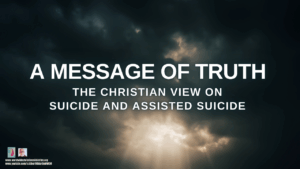Life, Death, and Hope – A Christian Response to Suicide and Assisted Suicide.
Introduction.
After 57 years in my journey of faith and 54 years in ministry, pastoral, evangelistic, and teaching, I must confess, with sadness, that I cannot recall this topic ever being preached or taught upon. That, in itself, is a tragedy.
Far too many of God’s people have been left to navigate the darkness of suicide and assisted suicide without biblical clarity or pastoral guidance. As a result, they’ve often grasped at spurious, non-biblical concepts, many of which stem from doctrinal distortions, such as those found in Roman Catholicism, which teaches that suicide is a mortal sin that condemns the soul. Others, including some evangelical streams, like strict Pentecostal Holiness traditions, some segments within Wesleyan-Arminian theology, and various revivalist groups, have wrongly asserted that suicide automatically results in a loss of salvation, even for truly born-again believers. This belief often stems from a misunderstanding of salvation as being contingent upon one’s final act, rather than on Christ’s finished work.
But Scripture tells a different story. And as I prepared for an upcoming Radio and TV broadcast, whilst preparing to release a YouTube teaching video and authoring a new book on the subject, I knew I had to investigate this deeply and prayerfully. This document represents that exploration, both theological and pastoral.
I have already published a YouTube teaching video on this topic, which can be viewed here: https://youtu.be/AycyefarFXQ?si=rsVjnd4t2BWm-Zg1
1. Life Belongs to God – Not Us.
From Genesis to Revelation, Scripture affirms one foundational truth: life does not belong to us. It is not a personal asset. It is a divine gift.
“Then the Lord God formed a man from the dust of the ground and breathed into his nostrils the breath of life, and the man became a living being.” – Genesis 2:7 (NIV)
“God formed Man out of dirt from the ground and blew into his nostrils the breath of life. The Man came alive, a living soul!” – Genesis 2:7 (The Message)
This divine breath is not symbolic, it’s literal. It is God’s impartation of spirit, soul, and value. Our existence is on loan. Our lives are not self-authored, and therefore, not self-ending.
“A person’s days are determined; you have decreed the number of his months and have set limits he cannot exceed.” – Job 14:5 (NIV)
“You decide how long anyone will live. You have established the number of his months. You set limits he cannot exceed.” – Job 14:5 (The Message)
Assisted suicide, however, introduces an even more grievous dimension. It not only involves the one seeking death but invites another, often a medical professional or loved one, into the act of taking a life. It’s not simply a private decision; it becomes a shared transgression.
When someone participates in the deliberate ending of another’s life, they cross a divine line. In doing so, they do not merely witness sin, they help execute it.
Assisted suicide invites another into that trespass, that sin, that murder. It blurs the role of caregiver and executioner. It turns compassion into complicity. Scripture commands, “You shall not murder,” and assisted suicide asks someone to do exactly that. Though clothed in mercy, it is still morally and biblically indefensible.
This principle is not just biblical; it’s affirmed even in secular criminal law. In jurisdictions where assisted suicide remains illegal, a person who aids, abets, counsels, or procures another’s suicide can be prosecuted. The legal system recognises what the Bible already declares: participating in someone else’s self-destruction is not a neutral act; it is criminal complicity.
The law often treats such acts as forms of manslaughter or even murder, depending on the level of involvement and intention. The act of assisting implicates the helper as a party to death, not just a witness to pain. In this way, criminal law parallels the moral law of Scripture: life is sacred, and no one has the legal or moral right to end it on behalf of another.
To those who assist in suicide, even from motives of sympathy, we must speak the truth in love: “You are being enlisted into a sin that does not belong to you.”
Ending suffering is noble. But ending life? That is not our right. God alone holds that authority. When we take it into our own hands, we’re not being brave, we’re being presumptuous.
Yes, we must approach this with immense compassion. But compassion without conviction becomes compromise. God is the Giver of life, and He alone should determine when it ends.
2. Our Suffering Has Meaning and Eternal Weight.
The world says suffering is something to be escaped. But Scripture says suffering is often a place of encounter. Pain, loss, grief, and chronic illness are very real. But Christianity offers a counter-cultural message: suffering is not meaningless.
“Not only so, but we also glory in our sufferings, because we know that suffering produces perseverance; perseverance, character; and character, hope. And hope does not put us to shame…” – Romans 5:3–5 (NIV)
“There’s more to come: We continue to shout our praise even when we’re hemmed in with troubles…” – Romans 5:3–5 (The Message)
Suffering isn’t meaningless. It’s not always curable, but it is always usable in God’s hands. Suffering may shake us, but it doesn’t have to shatter us. It can produce in us what prosperity never could: perseverance, depth, dependency on God, and a longing for eternity.
“For our light and momentary troubles are achieving for us an eternal glory that far outweighs them all.” – 2 Corinthians 4:17 (NIV)
“These hard times are small potatoes compared to the coming good times…” – 2 Corinthians 4:17 (The Message)
Even Jesus embraced suffering, not to glorify pain but to redeem it.
- He wept at Lazarus’ tomb.
- He sweat blood in Gethsemane.
- He embraced the agony of the cross, not to avoid pain but to redeem it.
Suicide and assisted suicide declare: “This pain is too much. There’s no way through it.”
Christianity responds: “There is purpose in the pain. There is redemption on the other side.”
3. Suicide Is a Tragic Violation – But Not an Unforgivable Sin.
Let’s be clear: Suicide is a sin. It violates the sixth commandment. It grieves the heart of God. It leaves behind devastation.
But it is not the unpardonable sin.
“And so I tell you, every kind of sin and slander can be forgiven, but blasphemy against the Spirit will not be forgiven…” – Matthew 12:31–32 (NIV)
“There’s nothing done or said that can’t be forgiven… But when you reject the Holy Spirit, you’re sawing off the branch on which you’re sitting.” – Matthew 12:31–32 (The Message)
Some wrongly teach that the unpardonable sin is simply speaking against the Holy Spirit, as if one angry outburst could permanently bar someone from grace.
But Jesus was speaking to religious leaders who had seen the miraculous, Spirit-filled works of God, and with full knowledge, they still called them demonic. Just like those mentioned in Hebrews 6:4–6, they had tasted, seen, and experienced, yet turned their backs deliberately and persistently.
This was not a slip. It was a rebellion. Their hearts had hardened beyond repentance, not because God stopped offering mercy, but because they stopped receiving it.
Suicide, on the other hand, is usually not rebellion; it’s despair. It’s mental anguish. Trauma. Deep isolation. It’s the result of suffering, not spiritual defiance.
Let’s be clear: The unpardonable sin is not suicide, it is the deliberate, hardened, final rejection of the Holy Spirit.
“I give them eternal life, and they shall never perish; no one will snatch them out of my hand.” – John 10:28 (NIV)
“They are protected from the Destroyer for good. No one can steal them from out of my hand.” – John 10:28 (The Message)
If someone truly belongs to Jesus, even their final moment of weakness cannot undo the eternal grip of grace.
- Grace is not fragile.
- Redemption is not brittle.
- Salvation doesn’t snap under pressure.
Let grieving hearts hear this: REDEMPTION IS STRONGER THAN DESPAIR – GRACE HOLDS TIGHTER THAN OUR GRIP.
4. Salvation Is by Grace – Not by Mental State at Death.
Here’s the heart of the Gospel: SALVATION IS NOT BASED ON HOW WE DIE; IT’S BASED ON WHO DIED FOR US.
“For it is by grace you have been saved, through faith…” – Ephesians 2:8–9 (NIV)
“Saving is all his idea… It’s God’s gift from start to finish!” – Ephesians 2:8–9 (The Message)
“Nothing… will be able to separate us from the love of God that is in Christ Jesus our Lord.” – Romans 8:38–39 (NIV)
“Absolutely nothing can get between us and God’s love…” – Romans 8:38–39 (The Message)
Salvation is not a mood. It’s not a mental state. It’s not up for review at the moment of death.
- It’s a miracle.
- Secured.
- Sealed.
- Final.
Even suicide cannot separate a true believer from the love of God in Christ.
5. Christians Oppose Suicide Because We Offer a Better Hope.
We don’t just preach against suicide; we preach for life.
“Come to me, all you who are weary and burdened, and I will give you rest.” – Matthew 11:28 (NIV)
“Get away with me and you’ll recover your life.” – Matthew 11:28 (The Message)
We offer refuge, not rules — Relationship, not religion — Hope, not shame.
To the suicidal, we say:
-
- You are not alone.
- You are not forgotten.
- You are not beyond grace.
To the world we declare:
- Life still matters.
- Suffering still has purpose.
- And Jesus is still enough.
Conclusion.
Suicide is a whisper that says, “There’s no hope.” But the Gospel roars: “There is always hope in Christ.”
Suicide lies: “There’s no way out.” — The Gospel answers: “There is always a way, through Jesus.”
We don’t just preach morality, we preach mercy — We don’t offer shame; we offer a Saviour. And His name is Jesus.
If you’re broken, battered, or feel like you’ve hit the end of the road, let me tell you — Jesus sees you. He knows. And He’s not finished with you yet.
Amen.
If you have invited Jesus Christ into your life then congratulations, it's great to know you have joined the family of God.What now?
- If this were a religion, you could expect someone to give you all sorts of Rules. Rituals. Requirements. And maybe a lot of stuff to buy!
- But when you asked Jesus into your life, you did not join a religion. Instead, you began a relationship with God. And that’s pretty amazing.
- You might be wondering, how do you get to know God better? How do you get to know God personally? If that is true then don't hesitate to contact us.
- Subscribe and we will send to you a Gospel of John and assist you in your new journey of discovery.







